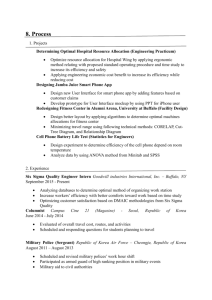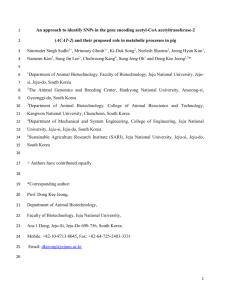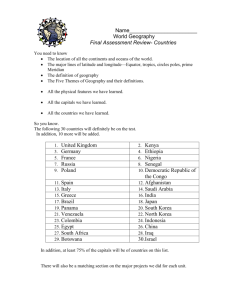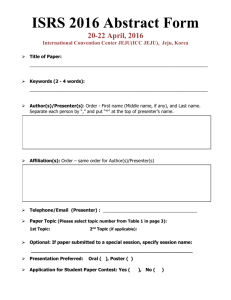The Latest Progress of FY-3C Peng ZHANG National Satellite Meteorological Center ,CMA 19
advertisement
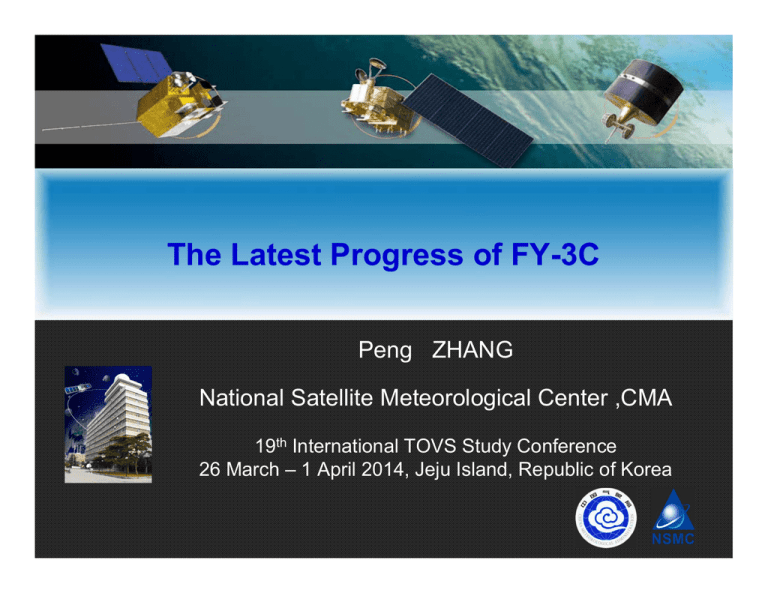
The Latest Progress of FY-3C Peng ZHANG National Satellite Meteorological Center ,CMA 19th International TOVS Study Conference 26 March – 1 April 2014, Jeju Island, Republic of Korea Outline FY-3 program in general Improvements of FY-3C Results from the commission test Timetable in 2014 19th International TOVS Study Conference 26 March – 1 April 2014, Jeju Island, Republic of Korea National Satellite Meteorological Center ,CMA 1. FY-3 program in general Launched Satellites in FY Polar System 1988.09.07 FY-1A Experimental 39 Days 1990.09.03 FY-1B Experimental 158 Days 1999.05.10 FY-1C Operational 6.5 Years 2002.05.15 FY-1D Operational >10 Years 2008.05.17 FY-3A AM Orbit Operation 2010.11.05 FY-3B PM Orbit Operation 2013.9.23 FY-3C AM Orbit Commission Test First Generation 2014/4/18 CZ-4 Second Generation 19th International TOVS Study Conference 26 March – 1 April 2014, Jeju Island, Republic of Korea FY-3 is the second generation of Chinese meteorological polarorbiting satellites. In the 1990s, the FY-3 series was designed in the concept to perform global, threedimensional, quantitative and multispectral observations under all weather conditions (i.e., both cloud-free and cloudy conditions) with multiple sensors on board 3 Fengyun Polar Decommission: FY-1D In operation: FY-3A + FY-3B Global Coverage per 6 hours In trail operation: FY-3C FY-3A LTC 10:00 AM 2014/4/18 19th International TOVS Study Conference 26 March – 1 April 2014, Jeju Island, Republic of Korea FY-3B LTC 13:40 PM 4 Initial Data Quality Assessment at ECMWF: Comparison of FY-3A with MetOp & Aqua STDEV (first guess departures): measures the misfit between model & measurement (in TB space) Microwave Humidity Sounder Microwave Temperature Sounder Microwave Imager Infrared Sounder 2014/4/18 FY-3A data quality is comparable with MetOp/Aqua equivalents 19th International TOVS Study Conference 26 March – 1 April 2014, Jeju Island, Republic of Korea 5 FY-3A/B follow-on FY-3 OPERATIONAL SATELLITE INSTRUMENTS MERSI – Medium Resolution Spectral Imager (I, II, FY-3C III) MWTS – Microwave Temperature Sounder (II) MWHS – Microwave Humidity Sounder (II, III) MWRI – Microwave Radiation Imager FY-3D FY-3E √(I) √(II) √(III) √(II) √ √ √ √ √(II) √(II) √(III) √(II) √ √ WindRAD - Wind Radar √ √ GAS - Greenhouse Gases Absorption Spectromete √ HIRAS – Hyperspectral Infrared Atmospheric Sounder √ √ OMS – Ozone Mapping Spectrometer √ √ GNOS – GNSS Occultation Sounder √ ERM – Earth Radiation Measurement (I, II) √(I) SIM – Solar irritation Monitor (I, II,III) √(II) SES – Space Environment Suite √ IRAS – Infrared Atmospheric Sounder √ VIRR – visible and Infrared Radiometer √ SBUS – Solar Backscattered Ultraviolet Sounder √ TOU – Total Ozone Unit √ 2014/4/18 FY-3F √ √ √(II) FY‐3 series is expected to last its measurements at least 15 years with additional four satellites. There are 16 improved or new instruments will be configured from FY‐3C to FY‐3F in the schedule. √(III) √ √ √ 19th International TOVS Study Conference 26 March – 1 April 2014, Jeju Island, Republic of Korea FY‐3C/D/E/F Payload Configuration 6 2. Improvements of FY-3C FY-3 OPERATIONAL SATELLITE INSTRUMENTS Launched on Sept 23, 2013 FY-3C MERSI – Medium Resolution Spectral Imager (I, II) √(I) MWTS – Microwave Temperature Sounder (I, II) √(II) MWHS – Microwave Humidity Sounder (I, II) √(II) MWRI – Microwave Radiation Imager √ WindRAD - Wind Radar GAS - Greenhouse Gases Absorption Spectromete HIRAS – Hyperspectral Infrared Atmospheric Sounder OMS – Ozone Mapping Spectrometer Inheriting all the instruments: 60% characteristics of the instruments specifications were improved twice than requirements New instrument: GNOS GNOS – GNSS Occultation Sounder √ ERM – Earth Radiation Measurement (I, II) √(I) SIM – Solar irritation Monitor (I, II) √(II) SES – Space Environment Suite √ IRAS – Infrared Atmospheric Sounder √ VIRR – visible and Infrared Radiometer √ SBUS – Solar Backscattered Ultraviolet Sounder √ TOU – Total Ozone Unit √ 2014/4/18 New Features: Improving the microwave sounding capability: MWTS II and MWHS II Improving the Solar measurements: SIM II 19th International TOVS Study Conference 26 March – 1 April 2014, Jeju Island, Republic of Korea 7 WMTSⅡ 2014/4/18 Parameter Specification Scan Angle ±49.5° Pixels Per Scan Line 90 Quantization 13 bits 15 Ch No. Central Frequency (GHz) 3dB Bandwidth (MHz) NE∆T (K) Main Beam Eff. Dynamic Range (K) Cal. Acc. (K) Purpose 1 50.3 180 1.20 90% 3~340 1.5 Surface Emiss. 2 51.76 400 0.75 90% 3~340 1.5 3 52.8 400 0.75 90% 3~340 1.5 4 53.596 400 0.75 90% 3~340 1.5 5 54.40 400 0.75 90% 3~340 1.5 6 54.94 400 0.75 90% 3~340 1.5 7 55.50 330 0.75 90% 3~340 1.5 8 57.290344(fo) 330 0.75 90% 3~340 1.5 9 fo±0.217 78 1.20 90% 3~340 1.5 10 fo±0.3222±0.048 36 1.20 90% 3~340 1.5 11 fo±0.3222±0.022 16 1.70 90% 3~340 1.5 12 fo±0.3222±0.010 8 2.40 90% 3~340 1.5 13 fo±0.3222±0.0045 3 3.60 90% 3~340 1.5 19th International TOVS Study Conference 26 March – 1 April 2014, Jeju Island, Republic of Korea Atmosphe ric Temperatu re Profile 8 WMHSⅡ Parameter Scan Angle ±53.35° Pixels Per Scan Line 98 Quantization 14 bits Ch No. Central Frequency (GHz) Pol ari zat ion Band width (MHz) Freq. Stability (MHz) Dynamic Range (K) NE ∆T (K) Cal. Acc. (K) Main Beam Widt h Main Beam Eff. Purpose 1 89.0 V 1500 50 3-340 1.0 1.3 2.0° >92% Surface and Precipitation 2 3 118.750.08 118.750.2 H H 20 100 30 30 3-340 3-340 3.6 2.0 2.0 2.0 2.0° 2.0° >92% >92% 4 118.750.3 H 165 30 3-340 1.6 2.0 2.0° >92% 5 118.750.8 H 200 30 3-340 1.6 2.0 2.0° >92% 6 118.751.1 H 200 30 3-340 1.6 2.0 2.0° >92% 7 118.752.5 H 200 30 3-340 1.6 2.0 2.0° >92% 8 118.753.0 H 1000 30 3-340 1.0 2.0 2.0° >92% H 2000 30 3-340 1.0 2.0 2.0° >92% 9 2014/4/18 Specification 118.75 5.0 Atmospheric Temperature Profile 10 150.0 V 1500 50 3-340 1.0 1.3 1.1° >95% Surface and H Precipitation Removed 11 12 13 14 15 183.31±1 183.31±1.8 183.31±3 183.31±4.5 183.31±7 H H H H H 500 700 1000 2000 2000 30 30 30 30 30 3-340 3-340 3-340 3-340 3-340 1.0 1.0 1.0 1.0 1.0 1.3 1.3 1.3 1.3 1.3 1.1° 1.1° 1.1° 1.1° 1.1° >95% >95% >95% >95% >95% Atmospheric Moisture Profile 19th International TOVS Study Conference 26 March – 1 April 2014, Jeju Island, Republic of Korea 9 GNOS Expected Products GNOS will receive two types of signal from GPS and China BeiDou-2. GNOS will observe over 1000 occultations per day with GPS and BD satellites, • Temperature profiles • Humidity profiles • Refractivity profiles • Electronic content profiles Frequency GPS L1/L2; BD2 Receiver Channels 8 (Navigation) 4 (Occultation) Sampling rate 1 ~ 50 Hz RMS Accuracy Crystal oscillator 1e-11 (100s) Real-time position 10m(RMS) Real-time velocity 0.1m/s(RMS) Phase center accuracy 2 mm (RMS) Antenna number 1 (Navigation) 2 (Occultation) 2014/4/18 Temperature Humidity Refracti vity Low Tropos. 0.5-3 k 0.25-1.0 g/kg 0.10.5% High Tropos. 0.5-3 k 0.05-0.2 g/kg 0.1-0.2% Low Stratos. 0.5-3 k -------- 0.1-0.2% High Stratos. 0.5-5 k -------- 0.2-2.0% GNOS instrument 19th International TOVS Study Conference 26 March – 1 April 2014, Jeju Island, Republic of Korea Electronic Content (100-600 km) < 20% GNOS observation 10 GNOS GPS Occultation Events: 426 Beidou Occultation Events: 184 2014/4/18 Products • Temperature profiles • Humidity profiles • Refractivity profiles • Electronic content profiles 19th International TOVS Study Conference 26 March – 1 April 2014, Jeju Island, Republic of Korea 11 3. Results from the commission test First Global Image on Oct. 2, 2013 from MERSI 2014/4/18 19th International TOVS Study Conference 26 March – 1 April 2014, Jeju Island, Republic of Korea 12 Tibet Plateau from MERSI/FY-3C (Dec. 3, 2013) 2013-12-04 13 2014/4/18 19th International TOVS Study Conference 26 March – 1 April 2014, Jeju Island, Republic of Korea 13 FY-3C MERSI: The Florida Peninsula 2014/4/18 19th International TOVS Study Conference 26 March – 1 April 2014, Jeju Island, Republic of Korea 14 FY-3C MERSI: Arabian Peninsula 2014/4/18 19th International TOVS Study Conference 26 March – 1 April 2014, Jeju Island, Republic of Korea 15 SRF homogeneity of the Multi detectors 0.9 0.9 0.8 0.8 0.7 0.6 0.5 0.4 0.3 0.7 0.6 0.5 0.4 0.3 0.2 0.2 0.1 0.1 400 500 600 700 Wavelength(nm) Spectral Response Function of IR5 of FY-3A MERSI 1 1 3A_IR5 0.9 0.9 R e la tiv e S p e c tra l R e s p o n s e 0.8 0.7 0.6 0.5 0.4 0.3 800 900 0 1200 1100 1000 3B_IR5 0.7 0.3 0.5 0.4 0.3 0.2 0.2 0.1 0.1 0.1 750 800 2014/4/18 850 900 Wavenuber(cm-1) 950 1000 1050 1100 2400 0.6 0.2 0 700 2200 3C_IR5 0.9 0.7 0.4 1800 2000 Wavelength(nm) FY−3C MERSI IR5 SRF 0.8 0.5 1600 1 0.8 0.6 1400 Spectral Response Function of IR5 of FY-3B MERSI Relative Spectral Response 0 R e la tiv e S p e c tra l R e s p o n s e FY-3C MERSI SWIR Relative Spectral Response Function 1 R e la t iv e S p e c t ra l R e s p o n s e Relative Spectral Response FY-3C MERSI VISNIR Relative Spectral Response Function 1 19th International TOVS Study Conference 0 0 700 700 750 800 850 900 950 1000 1050 1100 26 March – 1 April 2014, Jeju Island, Republic of Korea Wavenuber(cm-1) 800 900 1000 WaveNumber(cm−1) 1100 1200 1300 16 The improved detector homogeneity allows the improved cloud mask 2014/4/18 19th International TOVS Study Conference 26 March – 1 April 2014, Jeju Island, Republic of Korea 17 Global Image on Oct. 8, 2013 from MWHS 89GHz 118GHz-8 2014/4/18 150GHz 183GHz-4 19th International TOVS Study Conference 26 March – 1 April 2014, Jeju Island, Republic of Korea 18 NEdT Stability of MWTS 2013.12.1‐30 4 .5 1 2 3 4 5 6 7 8 9 1 1 1 1 4 .0 3 .5 NEDT(K) 3 .0 2 .5 2 .0 1 .5 1 .0 0 .5 0 .0 5 1 0 1 5 2 0 2 5 3 0 D a ys 2014/4/18 19th International TOVS Study Conference 26 March – 1 April 2014, Jeju Island, Republic of Korea 22 0 1 2 3 Uncertainty of Radiance Calibration IR from inter-calibration MW from uncertainty estimation of the on-orbit calibration system 2014/4/18 19th International TOVS Study Conference 26 March – 1 April 2014, Jeju Island, Republic of Korea 23 O-B of MWTS 2014/4/18 19th International TOVS Study Conference 26 March – 1 April 2014, Jeju Island, Republic of Korea 24 Conclusion of FY-3C One new instrument for occultation sounding Three instruments has been improved Good Image Quality Good Performance of the NE∆N and Calibration accuracy: 60% NE∆N of instruments on the FY-3C has been improve at least twice than on FY-3A/B Current in the trail operation 2014/4/18 19th International TOVS Study Conference 26 March – 1 April 2014, Jeju Island, Republic of Korea 25 4. Timetable in 2014 Launch : 23 Sept, 2013 Commission Test : Until Feb., 2014 Instrument Performance test SDR calibration Trail Operation : March to May, 2014 EDR validation Operation : Since June, 2014 Global data release Fengyun View toolkit release FY-3C IPP for DB users (since Sept., 2014) 2014/4/18 19th International TOVS Study Conference 26 March – 1 April 2014, Jeju Island, Republic of Korea 26 …… Stop Here 2014/4/18 19th International TOVS Study Conference 26 March – 1 April 2014, Jeju Island, Republic of Korea 27
